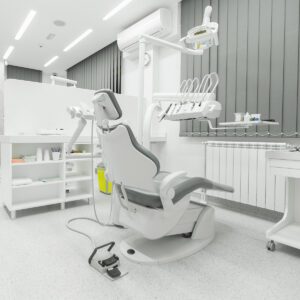Treatment in Abbotsford
Root Canal Treatment in Abbotsford
We can help you save your tooth and restore it to its original function.
Save Your Natural Tooth with Expert Root Canal Treatment
Our experienced dentists in Abbotsford specialize in root canal therapy to alleviate pain and save your natural tooth. Understanding the signs and knowing what to expect can make the process smoother and less intimidating.
Common Symptoms of Inner-Tooth Issues
- Teeth sensitivity to hot and cold temperatures
- Tenderness and inflammation in the gums
- Tooth discolouration
- Tenderness when biting or chewing
- Pain in the nearby lymph nodes
Are you a candidate for root canal treatment? Our clinic in Abbotsford can help.

Why Should I Get Root Canal Therapy?
A root canal therapy is done to save the natural tooth when the inner tooth has been damaged. Some common causes of inner tooth damage are:
Infections
Bacterial infections are the most common issue. Bacteria can enter the inner tooth pulp through decay or injury. When this happens, the inflammation and infection can cause an abscess to appear.
Chips and Fractures
When there is a chip or fracture to the crown of the tooth, a root canal may be required.
Injuries
Some tooth injuries can cause the tooth to become dislodged from its socket. After the dentist has stabilized the injured tooth, a root canal therapy is often needed.
Removal
If a tooth has been knocked out of the socket, it is important to rinse and place it back into the socket quickly. If this is not possible, put the tooth in a special dental solution (available in pharmacies) or milk to keep the inner structures of the tooth moist and alive until an emergency treatment is done. The tooth will be attached to the socket with a special splint and a root canal therapy will be performed to save the tooth.
What Is a Root Canal?
A root canal is a common dental procedure that can save your natural tooth and prevent the need for bridges or dental implants. A pulp is a group of blood vessels in the centre of your tooth. When the pulp is infected, it can cause temperature sensitivity, tooth pain or cause the gums to swell. A pulp infection can be caused by tooth decay, cracks or chips, or trauma.
What Can I Expect During My Root Canal Therapy?
Non-surgical Root Canal Procedure
A root canal can take between one to three sessions to complete. X-rays of your teeth will be taken and examined before the root canal treatment. During the first stages, local anaesthetic will be applied and a protective sheet will be placed to make sure the area is free of saliva during the treatment. Our dentist will make an opening in the surface of the tooth to remove the pulp. Afterward, the space will be shaped, cleaned and filled. We will apply cement on top to make sure that the root canals are completely sealed off. A temporary filling will often be placed to restore your tooth’s functionality. In the final appointment, a permanent crown will be placed.
What Can I Expect During My Root Canal Therapy?
Non-surgical Root Canal
A root canal can take between one to three sessions to complete. X-rays of your teeth will be taken and examined before the root canal treatment.
Non-surgical Root Canal
A root canal can take between one to three sessions to complete. X-rays of your teeth will be taken and examined before the root canal treatment. During the first stages, local anaesthetic will be applied and a protective sheet will be placed to make sure the area is free of saliva during the treatment. Our dentist will make an opening in the surface of the tooth to remove the pulp. Afterward, the space will be shaped, cleaned and filled. We will apply cement on top to make sure that the root canals are completely sealed off. A temporary filling will often be placed to restore your tooth’s functionality. In the final appointment, a permanent crown will be placed.
What Is a Root Canal?
A root canal is a common dental procedure that can save your natural tooth and prevent the need for bridges or dental implants.
What Is a Root Canal?
A root canal is a common dental procedure that can save your natural tooth and prevent the need for bridges or dental implants. A pulp is a group of blood vessels in the centre of your tooth. When the pulp is infected, it can cause temperature sensitivity, tooth pain or cause the gums to swell. A pulp infection can be caused by tooth decay, cracks or chips, or trauma.


How Is the Procedure Performed?
The affected pulp is removed and the tooth is cleaned and sealed. Typically, local anaesthesia will be used and the treatment may be done in one or more appointments. Root canal therapy has a 90% success rate. If your tooth is not a candidate for treatment, you will be informed during the consultation. After the treatment, you will be able to drive home and go on with your daily lives as usual. In addition to local anaesthesia, we also offer IV sedation if you prefer not to be awake during the procedure.
We will keep a record of your treatment and decide on the type of restoration necessary for your tooth. Typically, a filling or a crown is used to seal off the inside of the tooth.
The cost can vary on a case-by-case basis, depending on the severity of the infection and which tooth is affected. A root canal treatment is generally less expensive than tooth extraction or dental implants.
Root Canal Retreatment
If the tooth did not heal properly or had post-surgical complications, a root canal retreatment may be done. During this procedure, the dentist will remove the attached crown and filling material, clean the root canals and re-fill and re-crown the tooth. The success rate for this procedure is around 75%.
If the affected tooth has excellent bone support, a solid surface and healthy gums, it can be saved with root canal retreatment. Choosing retreatment can be less expensive than other alternatives, such as dental implants or bridges. These alternatives also require more maintenance and do not feel as natural as your real teeth.
What Can I Expect During a Root Canal Retreatment?
A local anaesthetic will generally be used. During treatment, the affected tooth is isolated with a rubber dam to protect it from saliva and bacteria. The amount of work done within a single appointment depends on the severity of inflammation and how complex the treatment is.
If a crown was placed on the affected tooth, it will be removed in order to gain access to the inner tooth. The filling material is also removed using an ultrasonic hand piece. The root canals will then be cleaned and reshaped. X-rays may be taken to ensure the roots are cleaned thoroughly. If this part of the procedure turns out to be too complex, medicated packing material will be applied and the cleaning process will be continued during the next visit. When the root canals are clean, gutta-percha is used to fill the space. This rubbery material seals off the area and acts as a barrier to prevent bacteria from coming in. in the final step, a temporary crown or filling is applied to the tooth. Eventually, a permanent colour-matched crown will be placed.
When it comes to your oral health, it pays to be proactive. Avoid dental extractions by scheduling routine exams at our clinic. Call us today!

When Is a Root Canal Retreatment Required?
A retreatment is typically done if the original root canal therapy fails. Some signs you might need a retreatment include:
- New tooth decay
- New crack in the treated tooth
- Leaking filling material or cracked crown
- Undetected complex canal structures
- Saliva entering the restored tooth
- Narrow or curved canals not treated during the original procedure
- There was a delay when placing restorative devices after the procedure
Proactive Dental Care in Abbotsford
Preventive care is key to avoiding extensive treatments. Regular check-ups at Medora Dental Care help detect issues early, saving you time and discomfort.
Don’t let tooth pain disrupt your life. Contact Medora Dental Care to schedule a consultation for root canal treatment in Abbotsford.
Testimonials
Need An Appointment?
Request a Visit
Our qualified staff strives to offer you a friendly service every time you come into the office. Call our office or fill out the form for an appointment.

Frequently Asked Questions
Alternatives include tooth extraction, followed by options like implants or bridges to replace the missing tooth. However, saving your natural tooth with a root canal is often the preferred and most beneficial option.
If untreated, the infection can spread, causing increased pain, swelling, or an abscess. This may lead to tooth loss and more serious health complications.
Local anesthesia ensures you shouldn’t feel pain during the procedure. Afterward, mild discomfort or sensitivity may occur for a few days, which can be managed with over-the-counter pain relievers.
Most dental insurance plans cover a significant portion of root canal treatment costs. Coverage varies, so it’s best to check with your provider for specific details.
Avoid eating until numbness wears off. Stick to soft foods and chew on the opposite side. Generally, you can resume normal activities shortly after the procedure, but follow your dentist’s advice.
Common side effects include mild pain or sensitivity. Rare complications might involve infection or damage to surrounding tissues. Contact your dentist if you experience severe pain or swelling.
Most people return to their normal activities the same day or the following day after a root canal treatment, depending on comfort levels.
Related Blog Posts
Should I Get a Root Canal or Pull the Tooth?
Do They Put You to Sleep for a Root Canal? A Dentist Explains
Do I Need a Crown After a Root Canal? Essential Information for Patients
Get In Touch
Contact Medora Dental Care to schedule your dental appointment today.
Office Hours
- Monday: 8:00 am – 5:00 pm
- Tuesday: 8:00 am – 5:00 pm
- Wednesday: 8:00 am – 5:30 pm
- Thursday: 9:00 am – 7:00 pm
- Friday: 8:00 am – 5:00 pm
- Saturdays: 9:00am – 2:00pm (Alternating) Closed Sundays & All Statutory Holidays